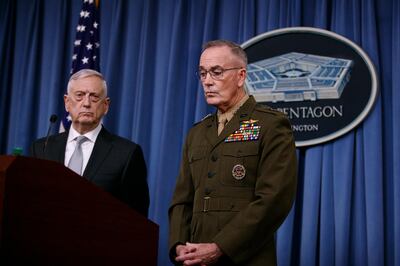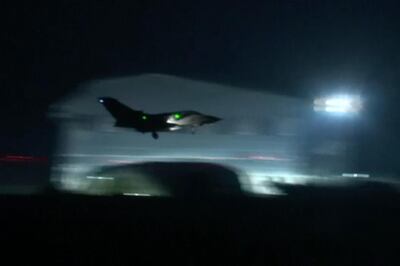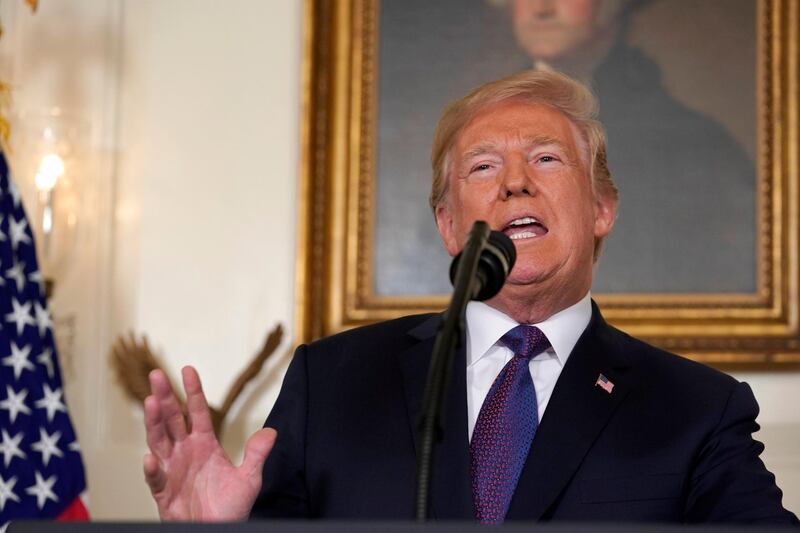- Follow our latest updates on Syria here
The US, UK and France launched a co-ordinated air campaign in Syria on Saturday morning targeting a research centre, two chemical weapons facilities and an Assad regime command centre in response to his use of chemical weapons in rebel-held Douma, exactly a week ago.
The air strikes, which began at 4am local time in Syria, were announced by Donald Trump in a televised statement from the White House, that followed a week of deliberations inside the administration.
“My fellow Americans, a short time ago, I ordered the United States Armed Forces to launch precision strikes on targets associated with the chemical weapons capabilities of Syrian dictator Bashar Al Assad. A combined operation with the armed forces of France and the United Kingdom is now underway,” Mr Trump said.
He said the mission was to “establish a strong deterrent against the production, spread, and use of chemical weapons” lambasting Iran and Russia for supporting Mr Al Assad.
In confirming the UK's involvement in the air strikes, British Prime Minister Theresa May said the military action would send "a clear signal to anyone else who believes they can use chemical weapons with impunity".
The Prime Minister @theresa_may has made a statement on Syria: https://t.co/bBfYyowUIo pic.twitter.com/QlTeFXmOkt
— UK Prime Minister (@10DowningStreet) April 14, 2018
French President Emmanuel Macron said in a statement that "we cannot tolerate the normalisation of the use of chemical weapons".
Mr Trump said that the US and its allies “are prepared to sustain this response until the Syrian regime stops its use of prohibited chemical agents”.
As he was speaking, missile strikes started Syria. The Pentagon, in a briefing with journalists, said three main targets were hit.
Joint chiefs of staff General Joseph Dunford said that targets were struck heavily in Damascus and Homs.
Reports on social media showed strikes in Qasyoun mountain, in Barzeh area, and near Homs.
The first target was the Syrian Scientific Studies and Research Center, the second was a chemical weapons storage facility west of Homs, and the last was a chemical weapons storage facility as well as a military command post.

US Defense Secretary James Mattis said the operation was meant to degrade Mr Assad’s chemical weapons capability, and declared the wave of air strikes over almost an hour after it started.
However, Mr Mattis threatened a sustained campaign if regime forces use chemical weapons in the war. There was no intention to “expand that target set,” he added.
Mr Mattis called the attack a “one time shot” in response to the Douma attack where 43 people reportedly died and hundreds were injured due to chemical weapons use, according to the World Health Organisation.
“I am confident the Syrian regime conducted an attack,” Mr Mattis said.
Mr Dunford stressed that Russia was not warned of the attack, nor did the US or any of its allies co-ordinate with Russia.
He said, however, that a deconfliction message was communicated to Russia via US forces at Udeid airbase in Qatar.

In 2017, when the US launched its air strikes on Shayrat airfield, Russia was given an advance warning to leave the base.
Mr Dunford said that the only retaliation came from the Syrian regime but it remains unclear if it succeeded.
Charles Lister, a senior fellow at the Middle East Institute, told The National that the strikes are an "unprecedented military statement from the US, UK and France in Syria and a very substantial escalation when compared to the 2017 Shayrat strike."
He said the targeting of multiple chemical weapons-linked facilities, the research facility and a command and control centre makes the air strikes the “most expansive response so far, given the risks inherent in an overly escalatory action.”
Mr Lister added that the presence of the UK and France alongside the US was highly significant.
“It adds much further to the pressure not just imposed on Damascus, but most importantly on Russia,” he said.
_______________
Read more:
Trump at odds with Mattis on Syria military response, report
UN chief warns that Mideast 'chaos' threatens global peace
Russia blames UK for staging 'fake' Syrian chemical attack
_______________






